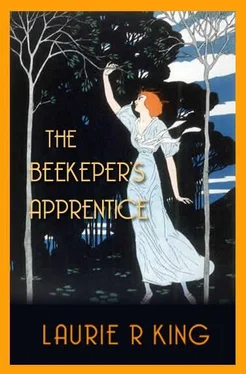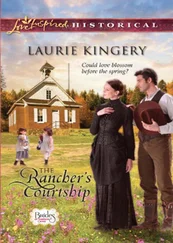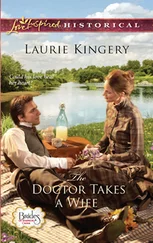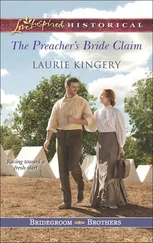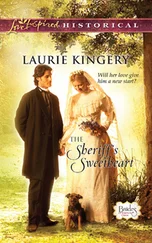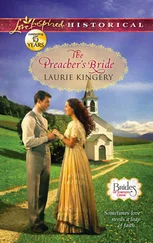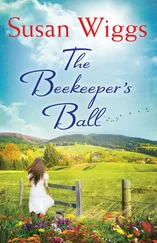I arranged the shirt in front of the coals to dry and turned to the exhausted man next to me.
"You need to lie down and sleep. Take my bed — no, I'll not hear protest. You need to be on your stomach for a while, and you cannot sleep in a chair in that position. No, I refuse to accept gallant stupidity in place of rational necessity. Go."
"Defeated again. I surrender." With a wan imitation of his sardonic smile he stood and followed me. I pulled aside the bedclothes, and he slowly lowered himself forward into my bed. I gently pulled the blankets up over his naked shoulders.
"Sleep well."
"You will need to wear a young man's clothing tomorrow. I trust you have some," he said around the pillow.
"Of course."
"Take a small knapsack with a few things in it. We will buy clothing if we are to be gone very long."
"I will pack it tonight." "And write a note to Mr. Thomas, telling him you've been called away for a few days, that you understand Mr. Holmes has been in an accident. He is in my employ; he'll understand."
"In your — you are a devious man. Go to sleep."
I wrote the note, including a request to ring Veronica Beaconsfield, telling her not to meet my train, and sat before the fire to braid my hair, which was dry at last. (The one drawback to long hair is washing it in the winter.) I studied the flickering coals as my hands slowly bound one- half of the fluffy cloud into a long plait that reached past my waist and tied a cord around the end. I had started on the other side when his voice came again from the dark corner, low and slurred with drink and sleep.
"I asked Mrs. Hudson once why she thought you wore your hair so long. She said it was a vestige of femininity."
My hands went still. This was the first time in our acquaintance that he had commented on my appearance, other than to disparage it. Watson would never have believed it possible. I smiled down at the fire and continued the plait.
"Yes, she would think that, I suppose."
"Is it true?"
"I think not. I find short hair too much fuss, always needing combing and cutting. Long hair is much easier, oddly enough."
There was no answer, but soon a gentle snore reached my ears. I took a spare blanket from the shelf and pulled it around me on the chair. My spectacles I laid on the little table next to me, the room retreated into fuzzi ness, and I slept.
I awoke once, some hours later, stiff and uncertain of my surroundings. The fire had burnt down, but I could see a figure seated at the window, wrapped in a blanket looking out at the night. I sat up and reached for my spectacles.
"Holmes? Is it —?"
The figure turned quickly toward me and held up a ringer.
"No, hush, child, go back to sleep. I'm only thinking, as best I can without lighting my pipe. Go back to sleep for a while. I'll wake you when it's time."
I laid my spectacles back onto the table, reached over to throw more coal on the fire, and settled myself again into the chair. As I drifted back into sleep, I experienced one of those odd and memorable dream-moments that lodge in the mind and, with hindsight, seem precognitive of events that follow. A phrase presented itself to my mind, with such stark clarity that it might have been in print before my eyes. It was a remembered phrase, from the speculative or philosophical introductory chapter in Holmes' book on bee-keeping. He had written, "A hive of bees should be viewed, not as a single species, but as a triumvirate of related types, mutually exclusive in function but utterly and inextricably interdependent upon each other. A single bee separated from its sisters and brothers will die, even if given the ideal food and care. A single bee cannot survive apart from the hive."
The surprise of the statement half woke me, or I seemed to half wake, and when I looked over at Holmes I had the oddest impression that there was a drop of rain on his cheek. Impossible, of course. I am now quite convinced that it was a dream, although the visual impression was vivid, if blurred through myopia. I mention it, not as historical truth, but as an indication of the complex state of my unconscious mind at the time — And, as I mentioned, because of the events it foreshadowed.
We must disentangle, therefore, what now is obscure.
"Wake, Russell," said a voice in my ear. "The game's afoot!" The room was dark but for the flame of the Bunsen burner, and the air smelt of coffee.
"Cry 'God for Harry! England and Saint George!'" I muttered grumpily to complete Henry's speech. Once more unto the breach, and all that.
"Indeed. But I fear that the game after whom the greyhounds strain is us. Up, now, drink your coffee. It may be some long time before your next hot drink. And your clothing — everything warm you own, while I return our borrowed goods to your neighbour. Perhaps," he added, "you might purchase another bottle of this ghastly brandy before your near neighbour returns. No light, now, we must be invisible."
By the time he returned I was dressed as a young man and held my heaviest boots in my hands.
"I shall put these on at the outer door. Mr. Thomas has excellent hearing."
"You know the building better than I, Russell, but I had thought to leave from the other end. Your corner here will be under observation from the street."
I sipped gingerly at the steaming coffee while I thought, and grimaced at the taste.
"Couldn't you have washed out the beaker before you made coffee in it? It tastes like the sulphur I was using yesterday. It's a good thing I wasn't experimenting with arsenic."
"I smelt it first. A little sulphur is good for the blood."
"Spoils the coffee."
"Don't drink it then. Come, Russell, stop dawdling."
I gulped half the scalding drink and poured the rest into the hand-basin.
"There is another way," I suggested thoughtfully, "one that avoids both the street and the back alleyway, and I doubt that anyone who hasn't studied a medieval map of the area would know about it. It debouches into an absolutely foul yard," I added.
"That sounds ideal. Do not neglect to bring your revolver, Russell. It may be needed, and it does us no good in your drawer with that disgusting cheese."
"My lovely Stilton; it's almost ripe, too. I do hope Mr. Thomas enjoys it."
"Any riper and it will eat through the woodwork and drop into the room below."
"You envy me my educated tastes."
"That I will not honour with a response. Get out the door, Russell."
We crept noiselessly through passages and hallways, into an attic where I used my new picklocks on the connecting door, and into a kind of priest's hole that had lain undisturbed for 250 years until the previous summer, when the fiancé of one of my housemates found a reference in a letter in the bowels of the Bodleian, searched it out, and landed a readership for his efforts. At one point we took to the dangerously slick roof, two inches of snow over ice.
Finally Holmes hissed at me.
"Are you lost, Russell? We've been nearly twenty minutes in this labyrinth. Time is of the essence, I trust you understand."
"I do. Our other possible route involved hanging by our hands and swinging between the buildings. While I know that physical discomfort is nothing in your eyes, I should prefer to wait until later in the day to have your back opened up, if you don't mind." The strain of responsibility was sharpening my tongue, and I bit back further words to concentrate on the route.
We eventually reached the noxious yard and stood before its pristine white surface, which obscured decades of horse droppings, kitchen slops, and other unmentionables. In the summer it rivalled my Stilton for olfactory potency.
We huddled in the door's recess, and I spoke to Holmes in a whisper.
Читать дальше
